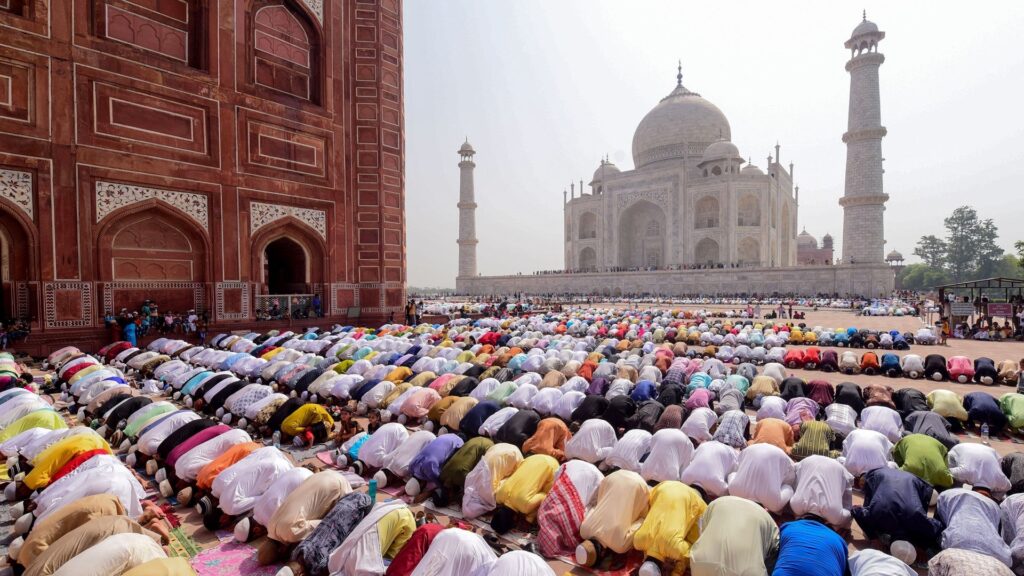Pakistan is a land rich in culture, history, and tradition, home to a vibrant and diverse population that celebrates its heritage and festivals throughout the year.
These celebrations reflect the country’s heritage and the diversity of its people.
From religious observances to seasonal celebrations, cultural festivals in Pakistan are a harmonious blend of tradition, festivity, and unity.
They offer a unique glimpse into the heart of the nation, where communities come together to celebrate their shared values and honor their distinct cultural identities.
Here, we discuss some of the most important cultural festivals in Pakistan.
List of 9 Most Traditional Festivals in Pakistan
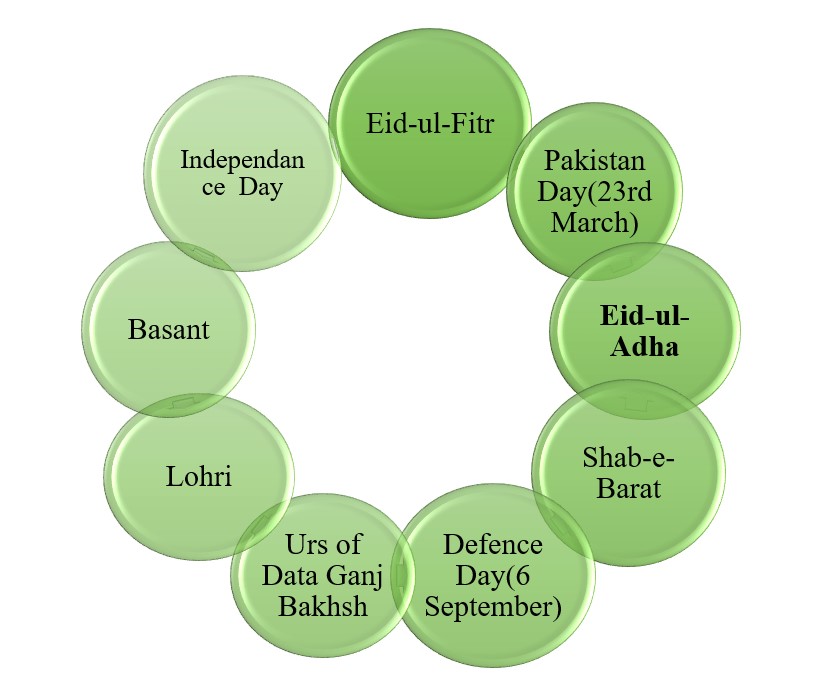
Eid-ul-Fitr
Eid UL fiitr is one of the Pakistan’s most highly anticipated festival.
This festival brings together families, friends, and communities in a spirit of gratitude, unity, and compassion.
It marks the conclusion of Ramadan, the holy month of fasting. On the event of Eid, known as Chand Raat, markets are bustling with people shopping for new clothes and gifts.
Traditions and Celebrations
- Special Eid Prayer: The day begins with special Eid prayers, performed in mosques and open grounds across Pakistan.
- Visiting Relatives and Neighbors: After the prayers, people visit family members and neighbors to exchange gifts and sweets.
- Traditional Dish – Sheer Khurma: A highlight of the celebration is “Sheer Khurma,” a traditional sweet dish made from vermicelli, milk, and dates, which is shared among friends and family.
- Zakat al-Fitr (Charitable Donations): One of the key aspects of Eid is the giving of “Zakat al-Fitr,” ensuring that the less fortunate can also participate in the celebrations.
- Joy and Festivity: Eid is a time of joy, marked by wearing new clothes and decorating homes for the occasion.
- Shopping Festivity: Bazaars and markets are lively and busy in the days leading up to Eid, with people shopping for clothes, jewelry, and gifts.
- Sense of Community: Eid fosters a strong sense of community, as people from all walks of life come together to celebrate, irrespective of their socio-economic status.
Unity in Diversity
Eid-ul-Fitr is a celebration that bridges ethnic and linguistic divides, uniting Pakistanis from all backgrounds.
While the customs may vary slightly between provinces—Sindh, Punjab, Khyber Pakhtunkhwa, and Balochistan—the essence of the celebration remains the same.
Eid-ul-Adha
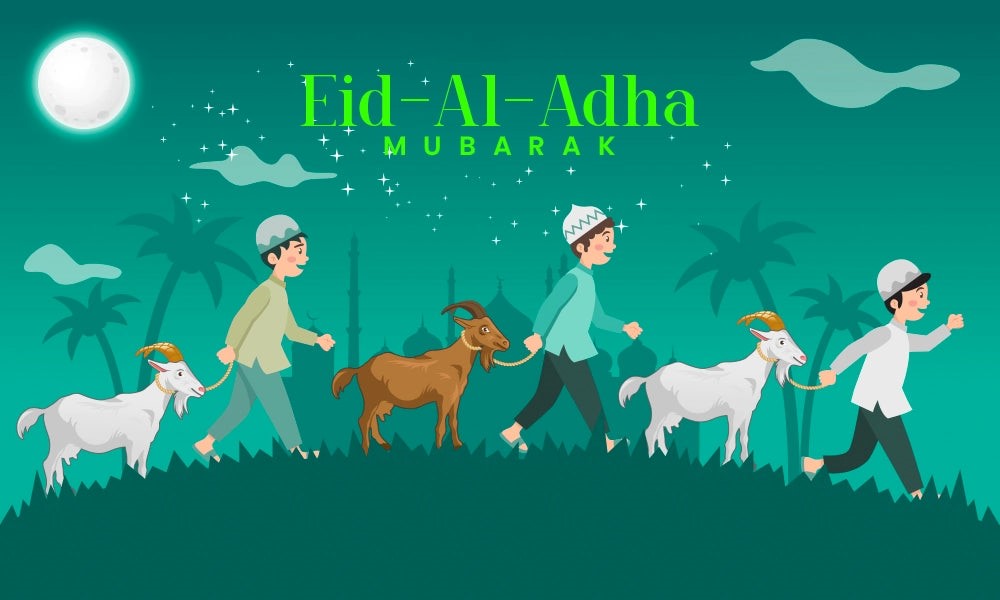
Eid-ul-Adha, also known as the “Festival of Sacrifice,” honors Prophet Ibrahim’s (AS) devotion and willingness to sacrifice his son, Isma’il (AS), as an act of obedience to God.
Families who observe the festival are financially able to perform the ritual sacrifice of an animal, often a goat or cow, as a demonstration of their faith.
The meat is distributed into three parts: one-third is given to the less fortunate, one-third is shared with friends and family, and the remaining portion is kept for the household.
However, this festival highlights the values of charity and sharing with those in need.
A Festival of Generosity and Brotherhood
- Community Spirit: Eid-ul-Adha emphasizes community support and solidarity, extending the spirit of personal sacrifice to the broader society.
- Charitable Focus: The festival ensures that the less fortunate have access to meat and meals, reinforcing the values of generosity and social responsibility.
- Unity in Purpose: By sharing resources, Eid-ul-Adha unites people in a common goal of caring for and supporting one another.
Basant
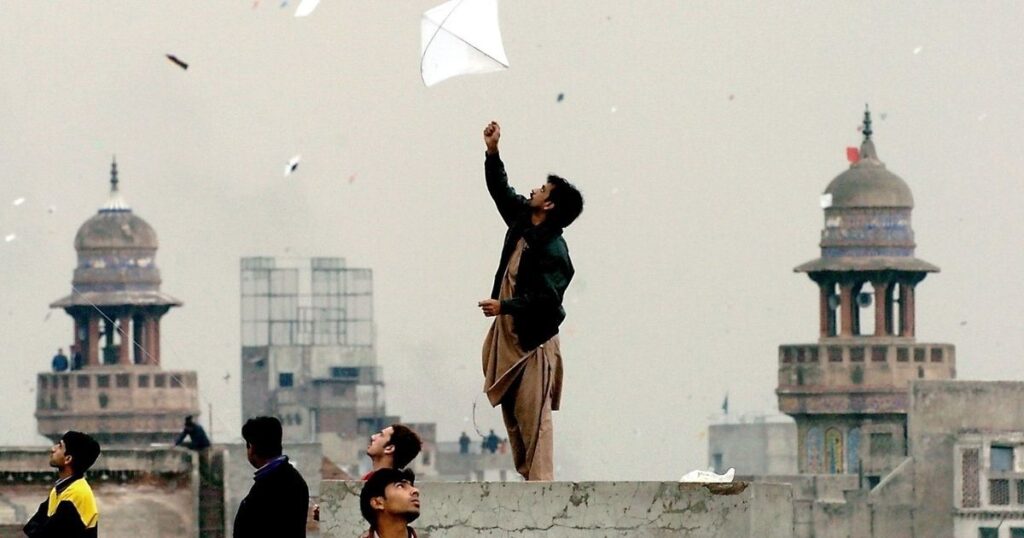
Basant is a colorful celebration that marks the arrival of spring, is particularly celebrated in the province of Punjab, especially in Lahore.
While Basant has its roots in Hinduism, it has become a secular festival in Pakistan, symbolizing the joy of renewal and the beauty of nature.
Traditions and Celebrations
- Kite-Flying Competitions: Basant is famous for its vibrant kite-flying contests, with colorful kites of various shapes and sizes filling the sky.
- Community Participation: People of all ages engage in kite-flying, making it a lively and joyous celebration.
- Rooftop Gatherings: In Lahore, rooftops become gathering spots for families and friends to fly kites, enjoy music, and indulge in traditional foods like “Dahi Bhalla,” “Samosas,” and “Pakoras.”
- Yellow Theme: Yellow dominates the festival, symbolizing the blooming mustard flowers of the season. Participants wear yellow clothing, and the streets are decorated with yellow decorations to enhance the festive ambiance.
A Celebration of Joy and Resilience
Basant is not just about kites; it is a celebration of life, joy, and resilience.
Despite occasional restrictions due to safety concerns, the festival remains a beloved cultural event.
Lohri
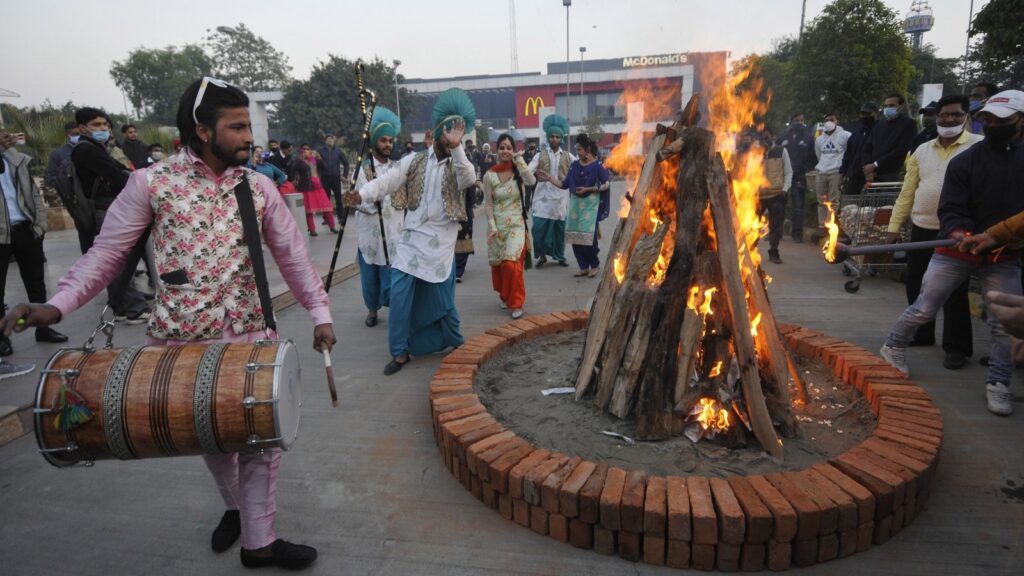
Lohri, primarily celebrated in Punjab, is a traditional harvest festival that marks the end of winter and the arrival of longer days.
It is a joyous occasion, especially for farmers, as it symbolizes the completion of the winter crop season.
Traditions and Celebrations
- Bonfire Gatherings: Families and communities come together around bonfires, enjoying a central part of the celebration.
- Traditional Songs and Dance: The festival includes singing traditional songs and dancing to the beats of the dhol (drum).
- Ritual Offerings: Offerings such as sesame seeds, jaggery, popcorn, and peanuts are thrown into the bonfire as part of the rituals.
- Special Celebrations: Newlyweds and newborns are honored with gifts and sweets, marking their special moments.
- Folk Dance: The traditional folk dance “Bhangra” is performed around the bonfire, enhancing the lively and festive atmosphere.
A Festival of Togetherness and Gratitude
Lohri is a time for family, friends, and neighbors to come together, celebrate, and express gratitude for the harvest.
Shab-e-Barat
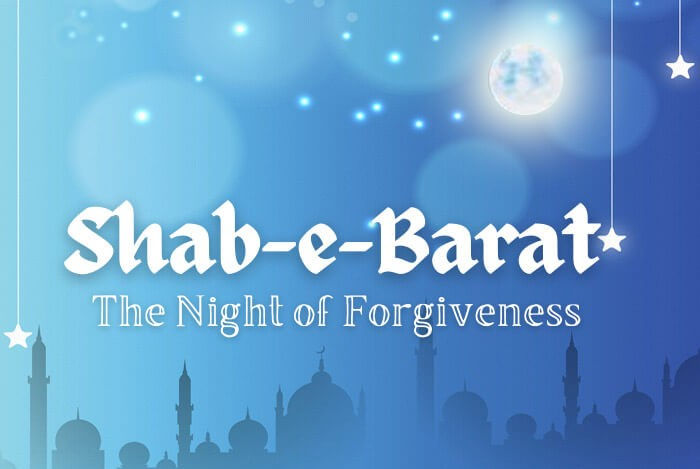
Shab-e-Barat is a significant religious observance for Muslims, occurring on the 15th night of the Islamic month of Sha’ban.
This night is dedicated to forgiveness and blessings, where individuals visit the graves of loved ones to pay their respects.
The festival is widely celebrated across Pakistan, with people dressing modestly and preparing special meals at home, followed by an extended night of prayer.
The mosques play an important role during this festival because they reflect the community’s communal prayers.
Sharing sweets with one another is a great way to build relationships and spread kindness in addition to enjoying some tasty cuisine. Everyone in the neighborhood participates and revels in the joyous atmosphere while fireworks crackle in the distance.
However, the night is marked by communal prayers and the devotion of the faithful, creating a profound sense of spiritual connection and tranquility.
Urs of Data Ganj Bakhsh
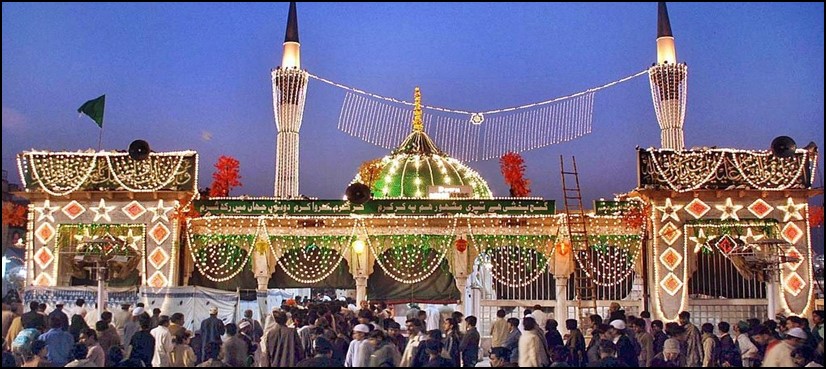
The Data Darbar Urs is a significant celebration in Pakistan, dedicated to Hazrat Ali Hujwiri, also known as Data Ganj Bakhsh (RA), a respected Sufi Saint from the 11th century.
His shrine in Lahore, Data Darbar, is the largest of its kind in South Asia.
This three-day event, held from the 18th to the 20th of Safar, draws over a million devotees. Pilgrims travel from across the country to spend the nights at the shrine, praying for their wishes.
The Urs features vibrant activities, including Malangs performing traditional dances, qawwali music, and the sharing of food with the needy around the shrine.
The celebration honors Hazrat Ali Hujwiri’s life and teachings, uniting people from diverse backgrounds in prayer and devotion.
Independence Day
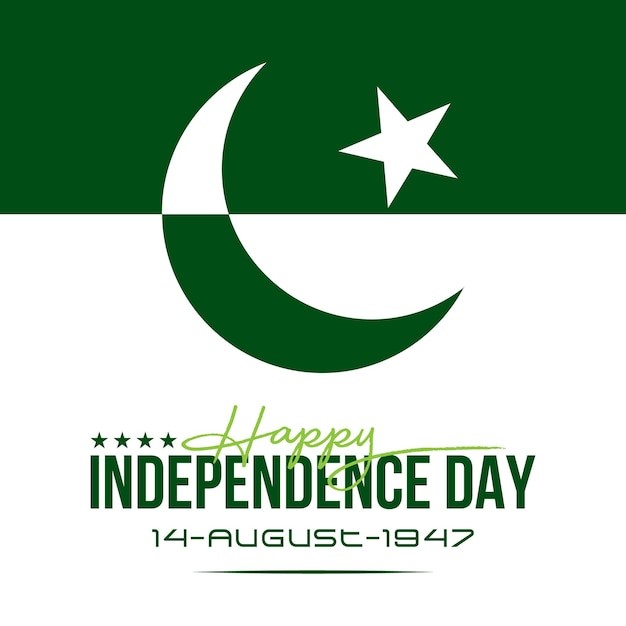
Festivals in Pakistan hold immense significance, deeply rooted in the country’s social heritage, including customs, traditions, moral values, folklore, and beliefs.
They play a crucial role in attracting tourists from around the world, contributing to both social and economic aspects of society.
Independence Day in Pakistan is a highly anticipated celebration filled with national pride and excitement. The festive spirit is especially vibrant in the cities, where people decorate their homes, attend parades, and join in celebrations, often donning green attire to show their patriotic spirit.
How People Celebrate Independence Day in Pakistan
Decorations: Homes, streets, and public spaces are decorated with green and white flags, lights, and banners to celebrate the national colors.
Wearing National Colors: People dress in green and white attire to show their patriotism and pride in the country.
Parades: Cities and towns host parades featuring military displays, cultural performances, and community participation.
Flag Hoisting: Special ceremonies are held for the hoisting of the national flag, often accompanied by the singing of the national anthem.
Public Events: Various events, including speeches by leaders, concerts, and cultural shows, are organized to commemorate the day.
Fireworks: The night sky is illuminated with fireworks displays, adding to the festive atmosphere.
Community Gatherings: Families and friends come together for picnics, barbecues, and celebrations at public parks and recreational areas.
Special Programs: Television channels and radio stations broadcast special Independence Day programs, including documentaries, patriotic songs, and historical retrospectives.
Educational Activities: Schools and educational institutions hold events such as essay competitions, debates, and performances related to Pakistan’s history and independence.
Sale of Merchandise: Shops and markets sell Independence Day-themed items, including clothing, accessories, and memorabilia, decorated in national colors.
Ceremonial Events: Government offices and institutions conduct formal ceremonies with speeches and tributes to national heroes and freedom fighters.
Cultural Performances: Traditional dances, music performances, and theatrical plays depicting Pakistan’s history and culture are showcased at various venues.
Pakistan Day (23 March)

Pakistan Day, also known as Yaum-e-Pakistan or Pakistan Resolution Day, is a significant national holiday celebrated on March 23 each year.
This day marks the anniversary of the Lahore Resolution of 1940, which laid the foundation for the creation of Pakistan. Moreover, it commemorates the adoption of Pakistan’s first constitution in 1956, making it the world’s first Islamic republic.
Celebrations
- Main Event in Islamabad: The primary celebrations take place in the capital, Islamabad, where the President of Pakistan serves as the Chief Guest.
- Military Parade: A major highlight of the day is a grand military parade that showcases the strength and capabilities of the Pakistani armed forces.
- Televised Parade: The day begins with a televised parade in the morning, featuring a display of military and cultural expertise.
- Award Ceremony: The President presents national awards and medals in a ceremony held at the Presidency.
- Tributes: Wreaths are laid at the mausoleums of Pakistan’s founders, Muhammad Iqbal and Muhammad Ali Jinnah, in honor of their contributions.
- Foreign Dignitaries: Occasionally, foreign dignitaries are invited to witness the celebrations, adding an international dimension to the event.
Pakistan Day holds profound significance in the country’s history, symbolizing national pride and unity.
Defense Day (6 September)
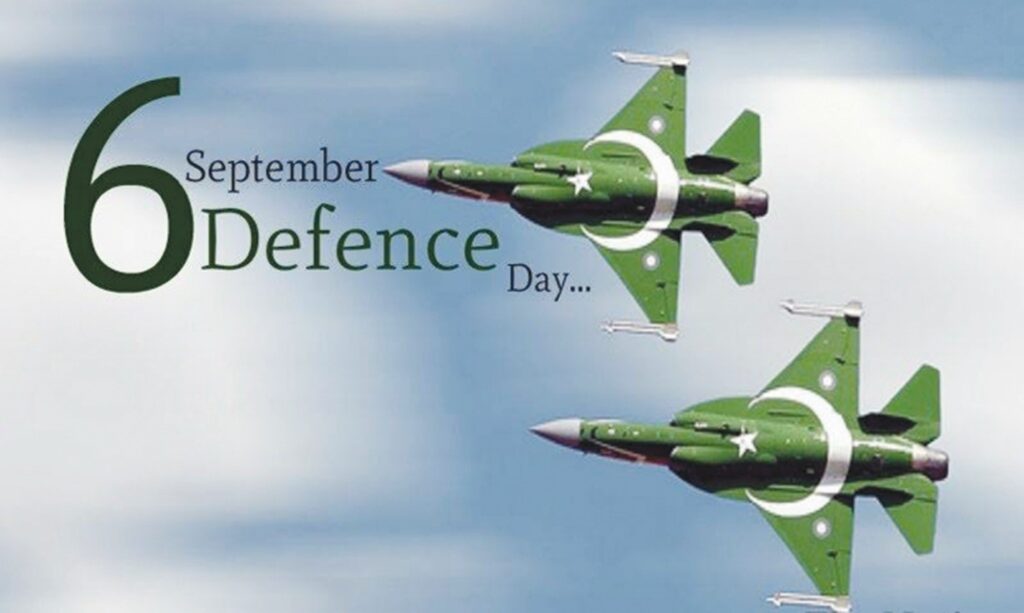
Defense Day in Pakistan, celebrated on September 6, is a deeply significant national event.
The day honors the country’s armed forces and their role in defending Pakistan’s sovereignty.
Defense Day celebrates the courage and resilience of the Pakistani military, highlighting the country’s strong commitment to its security and independence.
Key Observance
- Military Displays: The Pakistan Army showcases its advanced weaponry, including tanks, guns, and missiles.
- Guard of Respect: The Pakistan Air Force Academy cadets perform the Guard of Respect during the changing of the guard ceremony at Mazar-e-Quaid in Karachi.
Here Is a summary of all the festivals
| Festival Name | Calendar Month & Date | Islamic Month & Date | Weather During Event | Key Activities |
| Eid-ul-Fitr | Varies (April-May) | 1st Shawwal | Spring/Summer (Pleasant to Warm) | Special prayers, feasts, Eidi, charity (Zakat al-Fitr), family gatherings |
| Eid-ul-Adha | Varies (July-August) | 10th-12th Dhu al-Hijjah | Monsoon/Summer (Hot & Humid) | Animal sacrifice, charity, feasts, community prayers |
| Independence Day | August 14 | Monsoon/Summer (Hot & Humid) | Parades, flag hoisting, fireworks, cultural shows | |
| Pakistan Day | March 23 | Spring (Mild to Warm) | Military parades, award ceremonies, national speeches | |
| Defense Day | September 6 | Late Monsoon (Hot) | Military displays, national songs, patriotic celebrations | |
| Lohri | January 13 | Winter (Cold) | Bonfires, folk songs, dances, Bhangra, community gatherings | |
| Basant | February (no fixed date) | Spring (Cool to Mild) | Kite-flying, music, traditional food, wearing yellow attire | |
| Shab-e-Barat | Varies (March-April) | 15th Sha’ban | Spring (Mild to Warm) | Night prayers, mosque visits, charity, visiting graves |
| Urs Data Ganj Bakhsh | Varies (18th-20th Safar) | 18th-20th Safar | Fall/Winter (Cool) | Qawwali, Malang dances, charity, prayers at shrine |
Wrap Up
In a country as diverse as Pakistan, cultural festivals play a crucial role in promoting unity, harmony, and understanding.
People travel to Pakistan for its numerous religious and cultural celebrations throughout the world.
These vibrant celebrations showcase Pakistan’s diverse culture and joyousness, regardless of religion. They exhibit the spirit, diversity, and strength of the country via customs and celebrations.
Whether you’re a local or a visitor, these festivals offer a chance to experience the heart and soul of Pakistan’s rich cultural heritage.


